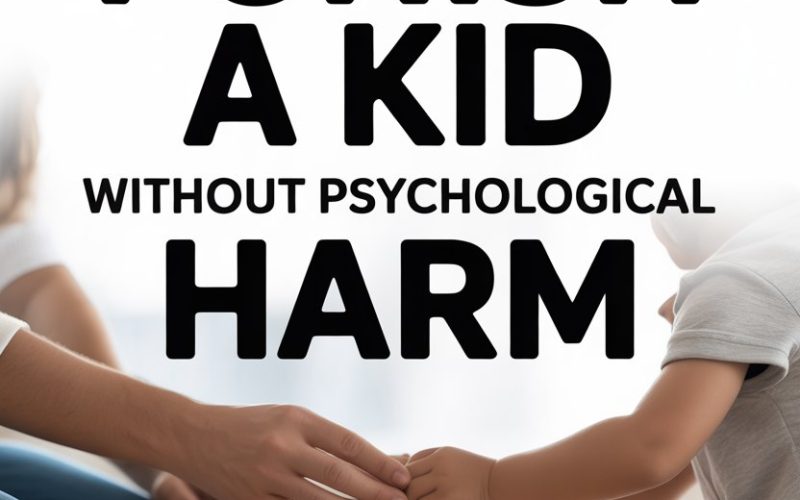Ever fantasized about a magical parenting wand that zaps away misbehavior—without leaving you riddled with guilt or your child traumatized for life? You’re not alone.
Busy mums and dads everywhere crave discipline that keeps relationships (and sanity) intact.
Turns out, it’s entirely possible to teach your child right from wrong—and keep their self-worth healthy—without resorting to threats or tears.
Here’s how to walk that tightrope, even after a day powered solely by instant coffee and pure willpower.
Rethink What Punishment Means
Before breaking out the naughty step, it helps to ask: what are we really after? The point isn’t to make your child feel miserable; it’s to help them learn better choices.
Punishment, in the classic sense, usually means making a child suffer as payback for bad behavior. But decades of child psychology research suggest this can damage trust, encourage sneaky behaviour, or even lower self-esteem.
So instead of “punishment,” try thinking in terms of “consequences”—preferably the kind that fit the crime and still let your child know you love their socks off.
Ditch the Shame
Ever been tempted to say, “You’re so naughty!” when your toddler pours orange squash into your boots? No judgment—sometimes the words slip out.
But shaming kids (even with an eye roll or a muttered “Why are you like this?”) lands more deeply than you think. According to child development experts, shame teaches kids that they are bad, not that their behaviour was bad.
Try this instead: focus on the action, not the child. “Spilling juice in my boots is not ok. Let’s clean this up together.”
You’re correcting the behavior, not attacking their character.
Consistency is King (or Queen)
Nothing confuses a child faster than a wobbly set of rules. “No telly after dinner” means “occasionally, if Dad’s in a good mood, you can mainline Peppa Pig.” Sound familiar?
Kids thrive on predictable boundaries—even if they pretend to hate them. Decide on your house rules (write them down if you must), and stick to them like glue.
If consequences are different every day, your child learns to gamble, not behave.
Logical Consequences Over Scary Ones
Ever tried grounding a six-year-old for a month? You’ll both be in tears by Day Three. Instead, let the consequence fit the misdeed.
If your child chucks their trainers in the garden and they get ruined, guess who’s sporting soggy socks tomorrow? That’s a logical consequence: they experience the results of their own actions, and no villainous parent required.
Experts at Harvard say this kind of discipline helps kids connect choices with outcomes (and makes your life easier).
Use Time-Outs Sparingly (and Kindly)
Time-outs get a bad rap, mostly because they’re used as the ultimate nuclear option. But when used right, a calm, short break can help a child reset—without drama or humiliation.
The trick? Keep it boring but not shameful. No lecturing, no “think about what you’ve done” in a menacing voice.
Instead, try: “You’re feeling out of control. Let’s have some quiet time on the sofa until you calm down. I’ll be here if you need me.” No banishing, just a pause button on the chaos.
Reward the Good Stuff
Catch them being decent—yes, even if it’s just remembering to flush. Positive reinforcement isn’t bribery; it’s noticing when your child gets things right.
According to researchers at Stanford, kids are more likely to repeat behaviours that get your attention in a good way.
Try a quick high-five, a sticker, or a silly happy dance. And if your child’s love language is words, a heartfelt “You handled that so well!” goes further than you think.
Pick Your Battles
The desire to correct every single act of mischief is strong. But if you try, you’ll burn out by Thursday. Ask yourself: is this a safety issue, or just a bit annoying? Will anyone remember this in a week?
If the answer is “not really,” sometimes you’re better off letting it slide—and saving your energy for the big stuff, like sibling brawls or actual danger (scissors + little brother = not ideal).
Model the Behavior You Want
Nothing ruins a good “use your words!” speech like snapping yourself. Children, for better or worse, are tiny mirrors.
If you want calm, respectful conflict resolution, demonstrate it—even when you’re ready to pull your hair out.
Messed up and lost your cool? No shame. Apologize, and let your child see that adults make mistakes and fix them, too.
According to parenting studies, kids learn more from what you do than what you say.
Natural Consequences are Gold
Sometimes, your best parenting move is to get out of the way and let reality do the teaching.
If your child forgets their lunch, a slightly grumbly stomach (once in a blue moon) is a better lesson than any lecture. Natural consequences teach responsibility—no threats or drama required.
Just be sure the outcome is safe. Letting them touch a hot stove? Absolutely not. Forgetting their umbrella and getting damp? That’s another story.
Stay Calm and Carry On (Even When You Want to Scream)
When a child acts out, it’s tempting to meet chaos with more chaos.
But discipline delivered in anger is a recipe for regret—and sometimes, for kids learning to fear you rather than trust you.
If you need to, step away for a moment. Breathe. Picture yourself on a tropical beach. Once you’re steady, you’re in a better place to respond, not react.
Kids will push your buttons (they installed most of them), but keeping your cool is half the battle.
Repair and Reconnect
After the dust settles—tears wiped, toys picked up—it’s crucial to rebuild the bridge.
A quick cuddle, a shared joke, or a “That was tough, but I’m glad we worked it out” reminds your child that you’re always on their side.
Attachment researchers remind us that repairing after conflict is what keeps kids feeling secure, even on the rough days.
Consequences to Avoid Like Week-Old Sushi
Certain disciplinary tools have a reputation for a reason—they do more harm than good. Spanking, yelling, harsh threats, or icy silent treatments can leave scars that last far longer than the misbehavior itself.
Studies from the American Academy of Pediatrics confirm that these approaches don’t just work poorly, they can actually increase anxiety, aggression, and long-term emotional trouble.
If you’ve slipped up in the past, you’re in solid company—most parents have. What matters is how you move forward, not beating yourself up.
A Word on Technology and Devices
Ah, the tablet—modern parenting’s best friend and worst enemy. Taking away screens can be an effective consequence, but make sure it’s related to the misbehavior (e.g., misusing tech = losing tech time).
Randomly yanking devices as punishment for unrelated issues just breeds resentment—and sneaky workarounds.
And when the device returns, a quick chat about expectations and limits helps prevent a repeat performance.
Saying Sorry: It’s Not Just for Kids
Kids aren’t the only ones who get things wrong. If you lose your temper, hand out a punishment that’s a bit much, or misjudge a situation, apologize.
You’re modelling humility and repair, and your child learns that everyone is allowed to be human.
“Sorry I shouted. I was frustrated. Next time, I’ll try to talk instead.” No need for a grand speech.
Just a little honesty goes a long way.
When to Call in Reinforcements
Some situations call for more than homegrown wisdom. If your child’s behavior is leaving you feeling hopeless, or if punishments aren’t making a dent, don’t be afraid to reach out.
School counsellors, paediatricians, and family therapists exist for a reason—and you’re not failing by asking for help.
According to child mental health professionals, a bit of outside support can make all the difference, especially if you’re stretched thin.
Your Relationship is the Real Magic
At the end of a day filled with sibling spats, muddy footprints, and mysterious crayon murals, the most powerful discipline tool is your relationship.
Kids who feel connected are more willing to listen—even if it takes a few reminders (or a hundred).
No system is perfect. Even the calmest, kindest parents get pushed to the edge now and again.
The aim isn’t perfection, it’s progress: raising children who know they’re loved—even after pouring juice in your boots.
And if all else fails, there’s always tomorrow (and maybe a fresh pair of socks).




